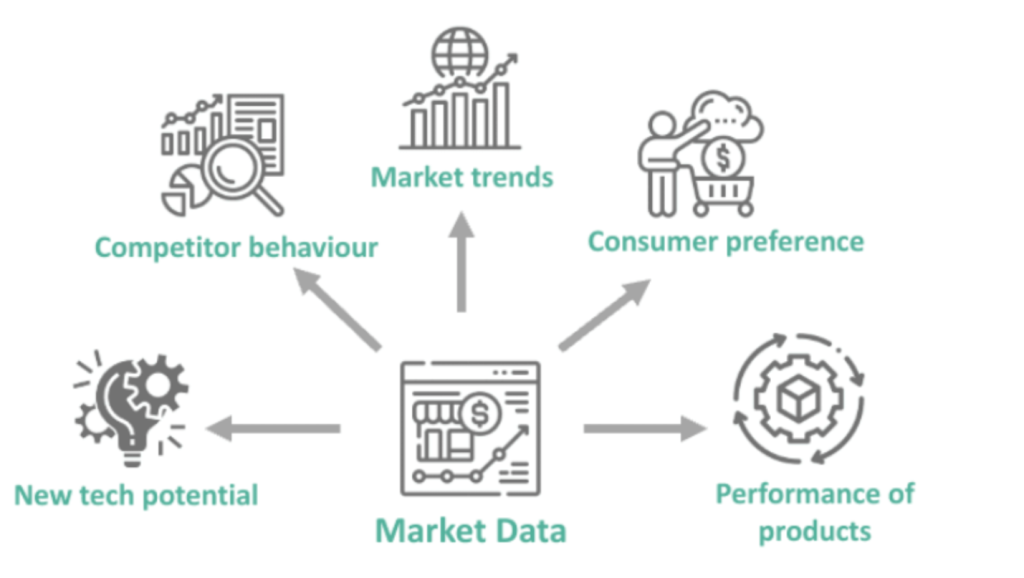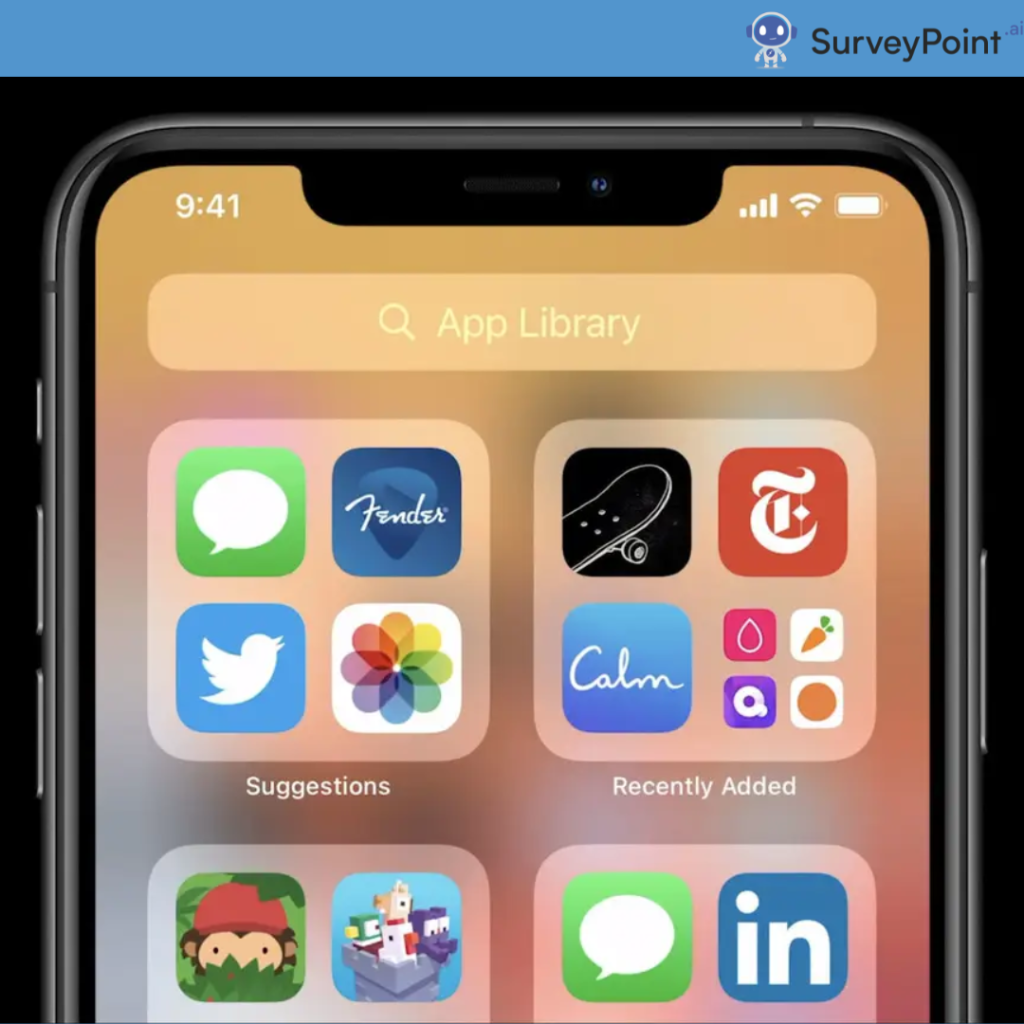
Just like detectives solve mysteries, market intelligence helps businesses solve the puzzle of understanding their customers, competitors, and industry trends.
In this way, companies collect and analyze data from various sources. This includes making surveys, taking customer feedback, and doing market research. All these methods are needed to gain a deeper understanding of the market landscape.
Businesses can develop effective strategies with this knowledge and stay ahead of the competition.
Market intelligence is the secret weapon that helps businesses make informed choices and achieve success.
What is Market Intelligence?
Businesses gathering and analyzing data about the market in which they operate or wish to operate must consider market intelligence. It is the actual data or information about the overall market for a company that goes beyond just the target market.

Among the many elements of market intelligence are data points like sales, customer information, survey results, focus groups, and competitor analysis. Collecting market information aims to aid in developing data-driven decisions about a company, not just its marketing efforts.
ALSO READ: Know the Market Research Challenges with its SolutionsDifferences Between Market Intelligence and Business Intelligence
Here’s a table that highlights the key distinctions between market intelligence and business intelligence:
| Market Intelligence | Business Intelligence |
| Focuses on external factors | Focuses on internal factors |
| Gathers information about customers, competitors, and market trends | Gathers information about business operations, performance, and internal data |
| Helps in understanding market dynamics and customer preferences | Helps in analyzing and optimizing business processes and strategies |
| Provides insights into market opportunities and potential risks | Provides insights into operational efficiency, cost reduction, and revenue generation |
| Involves gathering data from external sources like surveys, market research, and competitor analysis | Involves gathering data from internal sources like databases, transaction records, and operational systems |
| Helps in making informed decisions related to product development, marketing strategies, and market positioning | Helps in making informed decisions related to resource allocation, performance tracking, and business optimization |
| Supports sales and marketing teams in identifying target markets, customer segmentation, and demand forecasting | Supports management and executives in monitoring key performance indicators (KPIs), financial analysis, and strategic planning |
| Focuses on the external market environment and its impact on the business | Focuses on internal data analysis to improve efficiency and drive business growth |
| Provides insights for market entry, expansion, and competitive advantage | Provides insights for operational improvements, cost control, and decision-making at various levels of the organization |
While market and business intelligence have distinct differences, they can also complement one another. Both play critical roles in assisting businesses to thrive through the use of information, whether it is external market insights or internal operational data.
ALSO READ: 6 Common Potential Traps in Market ResearchHow Do Businesses Make Use of Market Intelligence?
When we consider successful organizations, their market intelligence team assists them in better understanding their market and making logical choices regarding their marketing strategies.
The following are some of the most crucial queries that market intelligence can respond to:
- Who are our rivals, and what are their advantages and disadvantages?
- How big is our market, and what are the growth trends?
- Who are our consumers and what are their needs, preferences, and behaviors?
- What new trends are there in our market, and how can we profit from them?
- What potential threats and opportunities do we face in our market, and how can we reduce them?
- Which marketing methods are most successful in reaching our target audience?
- How can we enhance our retention of clients and loyalty?
- What are the best ways to price our products?
- How can we stand out and offer our clients a special value proposition?
Here are four criteria for market intelligence:
- Competitor Intelligence: This entails learning about the competitors, including their strategies, weaknesses, and strengths.
- Product Intelligence: It helps businesses understand their products and how they compare to their competitors’ products. This means gathering product information, including features, benefits, and pricing.
- Market Understanding: This is the process of collecting information about the market, including market size, growth rate, and trends.
- Customer Understanding: Knowing your customers and creating targeted marketing campaigns that resonate with them is important. This involves knowing about customers, including their needs, preferences, and behaviors.
5 Ways To Collect Marketing Intelligence

- Surveys: Obtaining data for market intelligence typically involves conducting surveys. Online, by email, or in person are all acceptable methods of conducting them. They also help businesses to know their needs, preferences, and behaviors.
- Interviews: These can be conducted in person or over the phone and can provide businesses with qualitative information on their target audience.
- Focus Groups: In a focus group, a few people gather to discuss a specific product or service. These can provide companies with their target audience’s opinions and attitudes toward their products or services.
- Social Media Monitoring: Monitoring and analyzing social media platforms to gather information about consumer sentiments, trends, brand mentions, and competitor activities.
- Customer Feedback and Analytics: Collect customer feedback through channels like feedback forms, reviews, and customer service interactions. Another way is to utilize web analytics to understand user behavior and preferences on websites and digital platforms.
ALSO READ: Market Positioning Strategies: Fundamentals, Types, and ExamplesWrapping Up
People who work with market intelligence gather information to understand what customers want, what products are popular, and what new things might be a big hit. This helps businesses make smart decisions about what to sell and how to make customers happy.
Building market intelligence is possible with SurveyPoint by:
- Allowing you to create personalized surveys. Enabling you to gather valuable insights directly from your target audience.
- Providing you options to distribute surveys to a specific demographic or customer segment. Ensuring you collect data from the right audience to inform your market intelligence efforts.
- We offer powerful analysis tools that help you make sense of the collected data and identify trends.
- Gather feedback on competitor products, pricing, and customer satisfaction, enabling you to benchmark against industry rivals and gain a competitive edge.
- Surveypoint integrates with various platforms, allowing you to combine survey data with other market intelligence sources for a holistic view.




